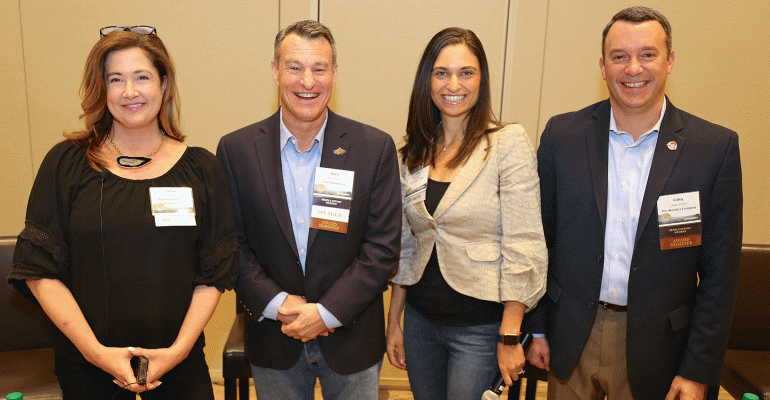Restaurant employee benefits are evolving as companies look for new ways to lure and retain workers, with some operators testing “instant pay” programs, expanding education benefits and offering free breast-milk shipping for working mothers.
“If we’re not thinking about these out-of-box ideas, we’re falling behind and it will be that much harder to keep or recruit [employees],” said Amy Cohen, president of the Chain Restaurants Total Rewards Association and head of benefits and compensation at Broomfield, Colo.-based Noodles & Company.
Cohen appeared on the “New Strategy for Total Rewards” panel at this week’s TDn2K Global Best Practices Conference in Plano, Texas, along with moderator Lynne Bartusek, CEO of Bartusek Advisory Services, as well as Mark Simpson, chief people officer at Louisville, Ky.-based Texas Roadhouse Inc., and Coley O’Brien, chief people officer at the Dublin, Ohio-based Wendy’s Co.
Restaurant employers are giving increased attention to paying team members every day, or so-called “instant pay,” a program that came to widespread attention in the gig economy when Uber Technologies Inc. pioneered it for drivers in May 2016.
Cohen said half of the CRTRA members in a recent survey were still unfamiliar with instant pay, but 17 percent of them were offering or pursuing the compensation plan, which allows workers to get paid on a designated debit card immediately for hours worked.
“The biggest hesitation, of course, is administration,” Cohen said.
“If you talk to your payroll team, they will be like: ‘Are you crazy?’”
O’Brien said a couple of Wendy’s franchisees are working on an instant-pay program.
“This is something we have prioritized as a place where we want to do some exploratory work,” he said.
At full-service Texas Roadhouse, Simpson said the brand has paid out cash tips to servers nightly for years. But with some locations processing as much of 95 percent of sales on credit cards, “There’s as not as much cash in the building,” Simpson said.
Setting up an instant-pay program has challenges, Simpson noted. “There’s a lot of hoops you have to jump through,” he said.
Educational programs are one area in which restaurant companies are leading the way, Cohen said. Brinker International Inc. recently announced a no-cost education benefit at its Chili’s Grill & Bar and Maggiano’s Little Italy brands. Denver-based Chipotle Mexican Grill Inc. and Seattle-based Starbucks Corp., have offered tuition benefits to employees.
Cohen said her survey of CRTRA members found half of them offer tuition reimbursement.
“One of the biggest things we’re seeing is the interest in offering student-loan-debt reimbursement,” Cohen said.
About 90 percent of CRTRA members are interested, but only 12 percent are offering it. Noodles & Co., she said, began offering it this year to general managers who qualify.
The student loan benefit pays toward the principal on the loan either through a match-payment program or a flat amount, she said, adding that it appeals to Noodles & Company employees, who have an average age of 23.
Language programs are also popular, Cohen said, not just for English as a second tongue but for managers to hone communication with back-of-house employee who might predominantly speak Spanish.
O’Brien said Wendy’s recently piloted a language program with Rosetta Stone, testing it with 500 employees in various markets. The company is still evaluating it, he added.
“What we learned through that process was the amount of focus, attention and infrastructure that has to be in place to get that off the ground,” he said.
Benefits have to be focused on meeting employee needs, Simpson added. Texas Roadhouse in the past few years has begun offering benefits in the areas of adoption assistance, paid adoption leave, donor leave, maternity leave, parental leave, sleep studies and virtual doctors.
“We were thinking in the past year or two of ways to really connect with our people,” Simpson said, “and be sure we are doing things that show we care about them as individuals.”
One new Texas Roadhouse benefit, aimed at working mothers, is Milk Stork.
“It’s for traveling moms,” Simpson explained.
“They can ship breast milk back and forth, and it’s paid for by the company. So wherever they are traveling, they can do it and ship it out.”
Noodles & Company is offering employees the opportunity to donate their time off to another team member who might need it, Cohen said.
“It gets back to the theme of ‘caring,’” she said. “Individuals want to give back to their communities but also to fellow team members. That’s not going to cost the company a whole lot.”
O’Brien said Wendy’s is discussing — but has not yet decided on — a new savings program for employees that uses the smartphone application called Acorns. It allows users to round up purchase amounts and have that money go into a savings account, he said.
To stay current on what benefits will appeal most to current and potential employees, O’Brien said Wendy’s taps into its franchise owners’ experiences and contacts.
“Our franchisees are some of our best sources of input,” he said.
Wendy’s has created a human-resources council to share best practices from among 20 franchise groups that that represent two-thirds of the 6,600-unit system. “That’s proving to be a good foundation for us, working within the joint-employer rules,” he said.
Simpson said Texas Roadhouse brings together managing partners three or four times a year to discuss various issues, including benefits. “We do some surveys, but we’re not really corporate-y,” he said.
“In today’s society,” added Simpson, a 30-year veteran in restaurant human resources, “the expectations of an employer are a lot higher than when many of us started. People want more out of us and expect more out of us, whether it be socially or benefits or compensation.”
Contact Ron Ruggless at [email protected]
Follow him on Twitter: @RonRuggless

